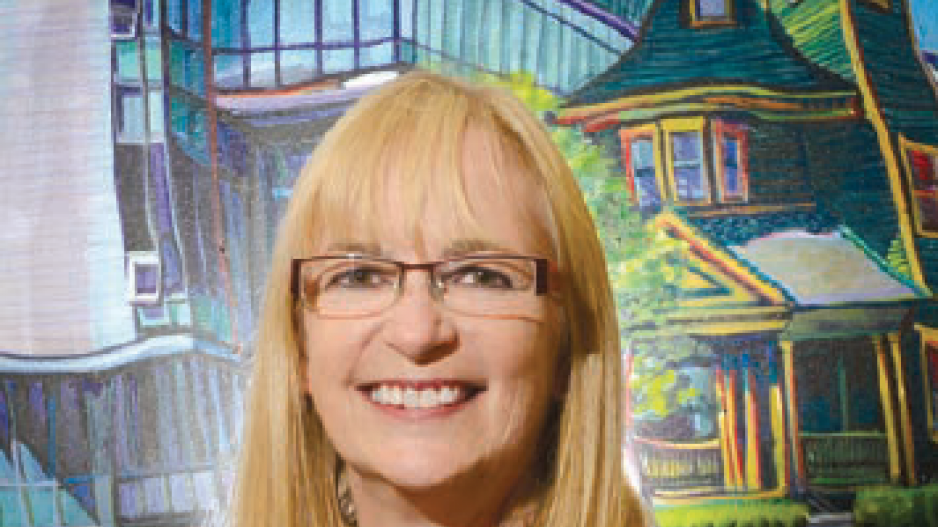For some people, there is a moment in time when they know exactly what they need to do in life. For Maxine Davis, the moment of truth arrived in 1996 when she was asked to head up the Dr. Peter AIDS Foundation in Vancouver.
She was at her desk at the Vancouver Health Department one day and got a call from Jay Wortman, one of the five people that visionary AIDS activist Dr. Peter Jepson-Young named to the foundation board, shortly before he died of the disease in 1992. Wortman asked her if she would take a leave of absence to head up the foundation as executive director.
“I just knew in my heart that that was what I wanted to do,” Davis said. “I have said many times that apart from raising my three daughters it is the most profoundly rewarding experience of my life.”
That moment was a long way in both space and time from her birthplace in the tiny fishing village of Twillingate on the coast of northeastern Newfoundland. Her childhood ambitions then were somewhat more modest: she wanted to take over the family’s little store. She also remembers seeing, at age 5, a “brand-new road” in the area.
“I just knew I wanted to see what was beyond that road,” she said.
Her journey away from Canada’s East Coast involved everything from cutting the grass in front of poet Robert Service’s cabin in the Yukon as an Opportunities for Youth intern and an ill-fated love affair with a Mountie, to graduating in social work at Memorial University before making her way to Vancouver.
She started in what was formerly known as the Children’s Aid Society, later absorbed by the Vancouver Health Department. She rose through a number of positions in 16 years there. It was while working in the West End, managing home support, that she first encountered the tragedy of AIDS – then an incurable disease.
“It was how people living with HIV were treated,” she said. “There was still discrimination, there was still a need for them to fight for everything they needed.”
Sadly, one of the things they needed most at that point was palliative care.
Davis actually became involved three years before the life-changing phone call from Wortman, when several AIDS groups came together to see how they could develop a daycare program to serve the AIDS community. “At that point, there was nothing between acute care hospital care and a private nursing home near Arbutus Village,” she said.
Together, representatives from the foundation and several other local AIDS organizations and related health groups agreed to put in $1,500 each to hire a consultant to conduct a feasibility study to assess the need for an HIV-AIDS day health program.
Another pivotal moment came in the spring of 1996, when the NDP’s Glen Clark stood in St. Paul’s Hospital and promised that if elected, he would give the foundation $1 million to do its work. He won the election that year and was as good as his word, she said.
With new funding, the foundation moved into an old wing across the street from St. Paul’s Hospital that fall. “It was a barren place that used to be an old psych ward, with tiles and electric wires hanging from the ceiling,” Davis said. But with an AIDS epidemic raging in the city’s Downtown Eastside and 900 new confirmed cases a year, there was little time to complain.
With the number of reported HIV cases down dramatically since those early days, as new drugs and treatments are “dialing down the epidemic,” Davis maintains the vast majority of individuals living with AIDS do not need the centre now. There is, however, a new but equally concerning need to treat another important group: HIV-AIDS patients with drug and mental issues, as well as those aging with AIDS.
“Our vision is to a time when we are not needed at all,” Davis said. “It’s a long way off, but it’s an aspirational goal.” •
Q&A
What sort of character traits or leadership styles do CEOs have to cultivate in the 21st century?
Today’s employees are looking for an inspiring workplace – a place driven by purpose and integrity. It’s the style of leadership that will make it so.
What accomplishments are you most proud of?
Apart from raising my three daughters, my most profoundly rewarding life experience has been the privilege of building on the legacy of Dr. Peter for the past 18 years. Today, the Dr. Peter Centre is recognized locally, nationally and internationally for its progressive approach to health care for vulnerable individuals living with HIV, mental illness, addictions, unstable living conditions and poverty – one of Canada’s greatest health-care challenges.
What is the biggest challenge you have faced?
It’s a challenging financial time in health care. The Dr. Peter has demonstrated its effectiveness in improving health outcomes and utilization of more expensive acute hospital resources. We can do much more on both counts. Health-care funding to sustain and grow the organization’s capacity is the stumbling block. Each year is a whole new financial challenge.
What career decisions would you make differently were you starting out today?
Each step in my career opened another door for personal and professional growth and new opportunities to make a meaningful contribution. It has been a most fulfilling journey. If I were starting out my career today, I’d do even more “leaning in.”
What’s one business lesson that you’d like to pass on to others?
Relationships matter. Take the time to constructively resolve issues so that, together, the greater good can be accomplished.
Celebrate exceptional leadership at Business in Vancouver's 2014 BC CEO Awards.




